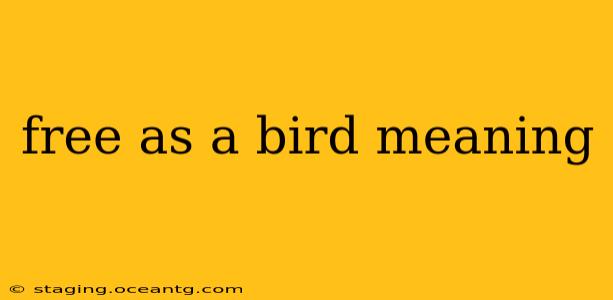The idiom "free as a bird" paints a vivid picture of unrestrained liberty. It describes a state of being completely unburdened, unrestricted, and independent, much like a bird soaring through the open sky. But what does it truly mean, and how can we apply this evocative imagery to our lives?
This article delves into the meaning of "free as a bird," exploring its nuances, origins, and practical applications. We'll also address some common questions surrounding the idiom.
What Does "Free as a Bird" Really Mean?
At its core, "free as a bird" signifies a complete absence of constraints or limitations. It speaks to a sense of liberation from responsibilities, obligations, or pressures that might otherwise restrict one's actions or choices. This freedom isn't just physical; it encompasses emotional and mental liberation as well. Someone described as "free as a bird" might be:
- Independent: They are self-reliant and make their own decisions without external influence.
- Carefree: They are unconcerned with worries or anxieties that might weigh down others.
- Unburdened: They are free from heavy responsibilities or obligations.
- Unrestricted: They are able to pursue their desires and goals without limitations.
The imagery of a bird in flight—soaring effortlessly through the sky—perfectly captures this feeling of boundless freedom.
What are the Origins of the Idiom "Free as a Bird"?
While the exact origin is difficult to pinpoint, the use of birds as symbols of freedom and liberty dates back centuries. Birds have always been associated with escape, independence, and spiritual liberation across various cultures and mythologies. The phrase itself likely emerged from the common observation of birds' unrestrained movement and ability to travel freely. Its popularity grew alongside the development of romantic literature and poetry, where the image of a bird in flight frequently served as a metaphor for freedom.
Is "Free as a Bird" Always Positive?
While generally used positively, the idiom can also carry a slightly melancholic undertone depending on the context. For example, someone might say they feel "free as a bird" after escaping a difficult situation or relationship, but this freedom might be tinged with sadness or loss. The context is key to understanding the full meaning.
How Can I Apply the "Free as a Bird" Mentality to My Life?
The feeling of being "free as a bird" is aspirational for many. While we may not be able to completely shed all responsibilities, we can strive for a greater sense of freedom in our lives. This can involve:
- Setting boundaries: Learning to say "no" to commitments that drain your energy.
- Pursuing passions: Making time for activities that bring you joy and fulfillment.
- Simplifying life: Reducing clutter and unnecessary commitments.
- Embracing spontaneity: Allowing room for unexpected adventures and experiences.
- Cultivating mindfulness: Focusing on the present moment rather than dwelling on anxieties about the future.
What is the Difference Between "Free as a Bird" and Other Similar Idioms?
While similar idioms exist, such as "as light as a feather" or "unfettered," "free as a bird" carries a unique connotation of active freedom and a sense of independence that transcends merely being weightless. It implies a dynamic and unrestrained lifestyle.
Can "Free as a Bird" Be Used Literally?
While primarily figurative, the idiom can be used in a more literal sense when describing animals, specifically birds, truly enjoying their natural freedom. However, its primary use remains metaphorical, capturing a feeling of human liberation.
In conclusion, "free as a bird" is more than just a catchy phrase; it's a powerful metaphor for a state of being that many strive to achieve. By understanding its meaning and applying its principles to our lives, we can cultivate a greater sense of freedom and fulfillment.
